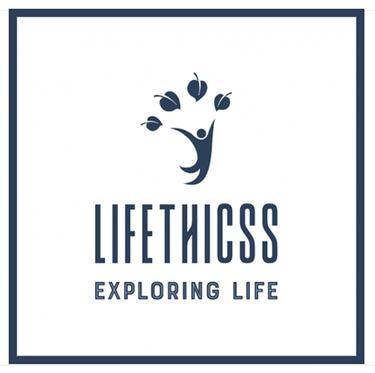

With the rise of AI, personal health is at its core: from virtual therapists to smartwatches, it's helping people stay healthy. Recent years have seen a shift in the individual welfare sector and other businesses due to artificial intelligence (AI). Technology and AI have revolutionized the way we think about health, enabling us to track our daily lives and provide mental health care. 'We have the ability to handle smart clothing, virtual doctors, AI-controlled exercise regimens and individual dietary guidelines more efficiently.' This paper seeks to understand how AI affects individual well-being and enables them to live more balanced and healthy lives.
AI's impact on personal wellness: from virtual therapists to smartwatches
www.lifethicss.com


MEDITATION IS NEED OF TIME
AND DEMAND OF HEALTH
@MEDITATIONETHICSS
You should be aware that wearable technology is one of the most obvious ways AI may improve personal wellness. AI-powered smartwatches and fitness trackers give consumers access to real-time health data, including cardiovascular data, sleep habits, and activity levels. AI algorithms are used by businesses such as Apple, Fitbit, and Garmin to evaluate user data and offer personalized health advice. AI-powered wear can identify irregular heartbeats, enable users to evaluate possible health hazards, and recommend lifestyle changes.
People may track their stress levels and integrate mindfulness and relaxation into their everyday routines thanks to the integration of artificial intelligence and sophisticated sensors. Additionally, the effects of wear and tear caused by AI are investigated, and suggestions are made for improved sleep quality, which eventually improves general health. driven by a virtual health assistant.
Artificial intelligence powers virtual health assistants.
Artificial Intelligence is revolutionizing healthcare. These tools provide up-to-date guidance on mental and physical health with the aid of NATU and digital AIDS learning.
In addition to basic monitoring, the AI systems can discover and improve nutritional inadequacies in users by providing replacement food. overall health. Certain AI-powered nutrition applications incorporate portable methods that offer real-time suggestions based on physical activity and metabolic rate. AI enables people to achieve their dietary needs and optimize their diets.
artificial intelligence applications in virtual medical and mental wellness.
In the fast-paced world of today, mental health is a big problem, and artificial intelligence can be quite beneficial. Through voice or chat-based conversations, AI-controlled virtual doctors provide patients with emotional support, cognitive behavioral exercises, and guided medical sessions.
Users can reduce stress, anxiety, and depression with the aid of convergent apps powered by AI, like Wysa and Woebot. Online advisors supply the copy mechanism backed by research and evaluate the user's responses using deep learning models. People who are reluctant to seek advice can now obtain treatment and confidentiality through the usage of AIAI-controlled mental health solutions.
Additionally, AI-powered apps for mood tracking use speech and text analysis to evaluate emotional well-being and identify trends that might point to mental health problems. Humans are capable of upholding their moral character and are able to ask for assistance when needed.
AI-Driven Fitness Programs.
Have you ever participated in the AI fitness course? The field of training has been transformed by AI, which now offers tailored training programs tailored to the needs of each individual. Personal training programs created by fitness apps like Fitboder and Freeline were based on the analysis of performance, user preferences, and training goals. These applications utilize AI features. These apps enable users to modify their exercise regimen and level of intensity based on real-time progress to achieve optimal results.
Moreover, AI-I-powered virtual personal trainers use movement tracking and data vision to guide consumers through their training. AI is utilized to evaluate the shape of platforms like pace and mirrors, analyzing their shape and providing real-time response to decrease injury risk and improve exercise efficiency. This level of privatization promotes motivation and consistency among individuals during training.
AI In chronic disease management.
AI provides a way to start treating long-term illnesses including diabetes, heart disease, and others. Artificial intelligence-powered health monitoring tools use patient data to predict disease outbreaks and provide preventative measures.
By identifying rich glucose meters, AI can track blood glucose levels and give diabetics real-time feedback to help them take their insulin dosages more effectively. Platforms like Livongo, which are powered by AI, offer patients individualized care that includes real-time health data analytics to assist in managing their illnesses. People now have the strength to control their health and avoid issues thanks to the progress.
Boundaries and ethical issues in AI for personal welfare.
Furthermore, AI should be augmented rather than compensating individuals who provide services. AI can offer insight and assistance, but only after consulting with a medical professional for diagnosis and treatment. Users should view the AI-managed wellness tool as a complement to traditional health services, rather than relying on it as an all-in soluolution for AIDS.
Personal well-being and the future of AI are in question.
AI in the field of human welfare has a bright future, with continuous advancements towards better personal health.' The integration of artificial intelligence into daily life is anticipated, with advanced wear balls, virtual reality therapy, and AI interest technology assisting in real-time health insight.
With the growth of AI, it will become more personalized, offering advice based on genetic information, daily habits, and instantaneous health data. Ai-Vacal Wellness Solutions intends to boost the activity of health services, enabling people to identify potential health issues before they become a concern.
BY is well aware of how AI transforms personal wellness by increasing the accessibility, effectiveness, and convenience of health management. People can use AI-powered devices, such as the Smart Watch, to watch virtual doctors and provide critical signals to them in order to live healthy lives. AI provides enormous advantages for human welfare, despite the fact that we still need to overcome bias in data and algorithms. Why? People can take proactive measures for their physical and emotional well-being and live better, more beautiful lives by utilizing AI-controlled advancements in the healthcare system. We ought to make this technology an essential component of the general welfare of our society.
for more interesting blogs visit
www.lifethhicss.com


AI's impact on personal wellness: from virtual therapists to smartwatches

LET'S MAKE LIVES BETTER

